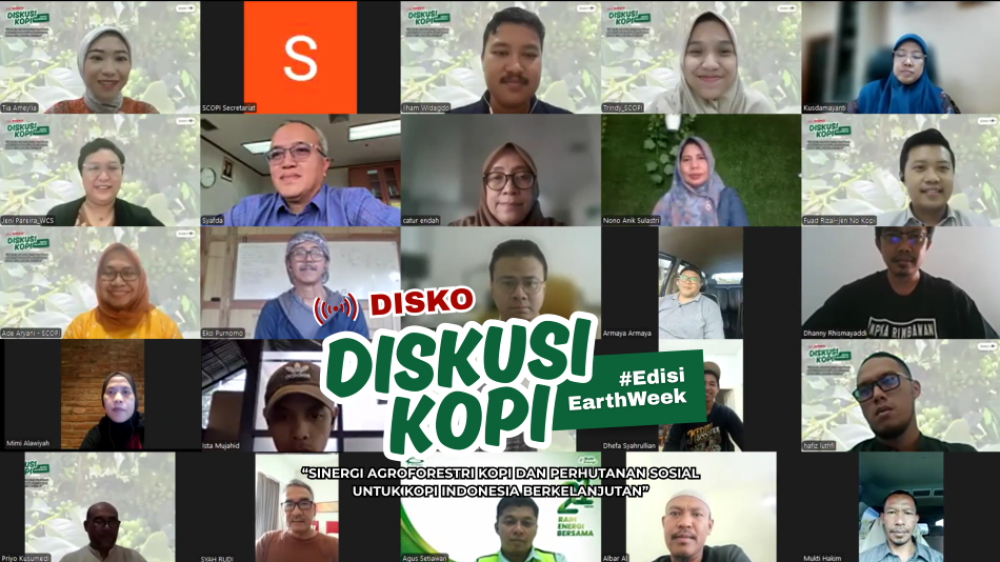SCOPI Online Coffee Discussion Synergy Between Agroforestry and Social Forestry as the Key to Sustainable Indonesian Coffee and Forest Conservation
JAKARTA, April 28, 2025 – In line with the momentum of Earth Week 2025, the Sustainable Coffee Platform of Indonesia (SCOPI) hosted an Online Coffee Discussion (DISKO) themed “Synergy of Coffee Agroforestry and Social Forestry for Sustainable Indonesian Coffee” on Friday, April 25, 2025. The event underscored SCOPI’s commitment to advancing sustainable coffee practices aligned with the 2025–2030 Collective Action Plan (CAP), which primarily aims to improve farmer livelihoods through regenerative agriculture.
In her opening remarks, SCOPI Executive Director Ade Aryani stated, “The synergy between agroforestry and Social Forestry lies at the heart of the regenerative agriculture approach we promote. Through training Coffee Master Trainers as key agents of change, we strive to disseminate these sustainable best practices to coffee farmers across Indonesia—for the benefit of both farmer welfare and environmental sustainability.”
The discussion spotlighted agroforestry as a crucial solution to climate crisis challenges and biodiversity loss. This practice integrates trees with coffee crops, offering ecological benefits such as soil and water conservation, enhanced biodiversity, and increased productivity. It is strongly aligned with the government’s Social Forestry (SF) program, which grants legal access to forest management for communities—creating a valuable opportunity for farmers to apply sustainable cultivation methods.
Moderated by Jeni Pareira of the Wildlife Conservation Society (WCS), a SCOPI member, the event featured insights from key stakeholders.
Syafda Roswandi, S.Hut., M.Si. (Director of Social Forestry Control, Ministry of Environment and Forestry) opened by outlining the policy landscape for Social Forestry, including the 12.7 million-hectare target and the significant potential for coffee within this scheme. He emphasized the importance of accelerating SF implementation through legal access distribution, enterprise development, and intensive mentoring. Notably, he highlighted a major challenge: only 44% of coffee SF groups currently have access to qualified facilitators—far short of the ideal one facilitator per SF permit. He called for multi-stakeholder collaboration and the use of digital platforms like the Ministry’s Learning Management System (LMS) for training materials.
Catur Endah Prasetiani, S.Si., M.T. (Director of Social Forestry Enterprise Development, Ministry of Environment and Forestry) elaborated on downstream strategies and value addition for SF coffee. She explained that coffee from agroforestry systems under SF not only excels in quality and distinctive flavor but also holds strong export potential. Enterprise development is supported through five facilitation pillars: institutional strengthening, commodity development, product standardization and value enhancement, entrepreneurship, and business partnerships. The role of Social Forestry Business Groups (KUPS)—with 1,140 groups focused on coffee—is pivotal in driving local economies, supported by Integrated Area Development (IAD) and Thematic Business Development approaches.
Dr. Ir. Kusdamayanti, M.Si. (Head of the Center for Human Resources Education and Training, Ministry of Environment and Forestry) focused on human resource capacity building. She presented the HR Training Center’s strategic plans, including the development of a Corporate University and expanded access to learning through Massive Open Online Courses (MOOCs) and Micro Learning. “We are currently finalizing a Draft Curriculum on Coffee-Based Agroforestry Techniques in collaboration with SCOPI, which will serve as a crucial guide for implementing coffee agroforestry and supporting the Social Forestry program,” she noted.
From a practitioner’s perspective, Eko Purnomowidi of Klasik Beans shared field experiences and insights from a TriDEP exchange program with India. He emphasized sustainability as “Continue Wisdom”—a balance between Planet, People, and Profit. Eko views agroforestry as a traditional wisdom aimed at achieving productivity resilience through deep geographic understanding. Key lessons from India highlighted the need for strong institutional governance, while Indonesian farmers face challenges including limited access to research/information, working capital, capacity building, and market access.
Overall, this edition of DISKO SCOPI reaffirmed that the synergy between coffee agroforestry and Social Forestry forms an essential foundation for a sustainable and inclusive Indonesian coffee sector. Its successful implementation demands active stakeholder collaboration, ongoing human resource development, innovation in enterprise growth, and robust policy support—all aligned with Earth Week’s spirit of empowering collective action for a better planet.
About SCOPI:
The Sustainable Coffee Platform of Indonesia (SCOPI) is a multi-stakeholder platform comprising diverse actors in Indonesia’s coffee sector. SCOPI is committed to supporting sustainable coffee practices by enhancing farmer capacity, promoting Good Agricultural Practices (GAP), and facilitating partnerships to build a globally competitive, sustainable, and farmer-centric Indonesian coffee sector.
Contact:
Ilham Bayu Widagdo
Program Coordinator, SCOPI Secretariat
Email: [email protected]
Hp: 089605499758

